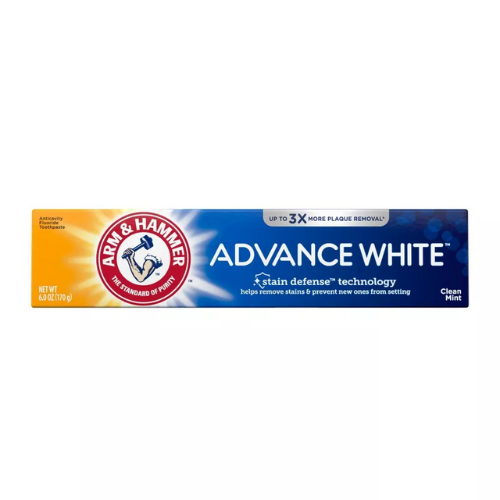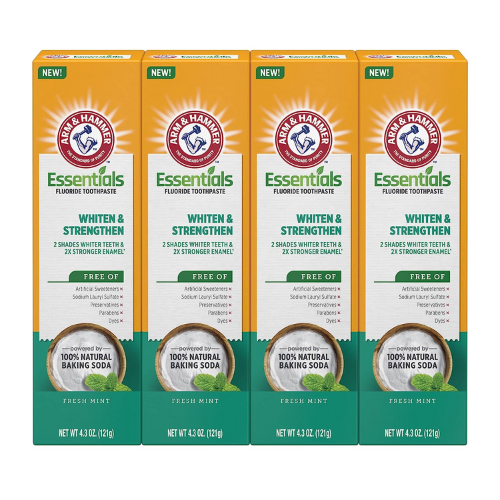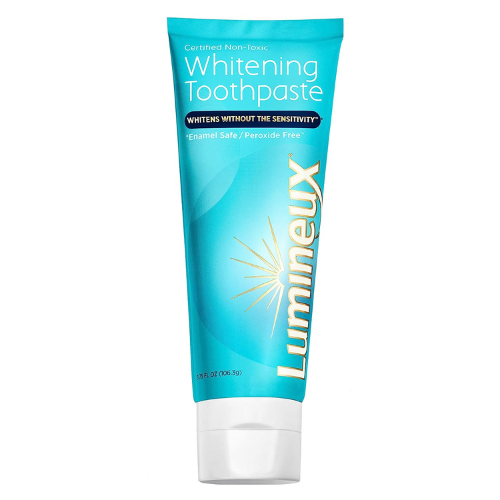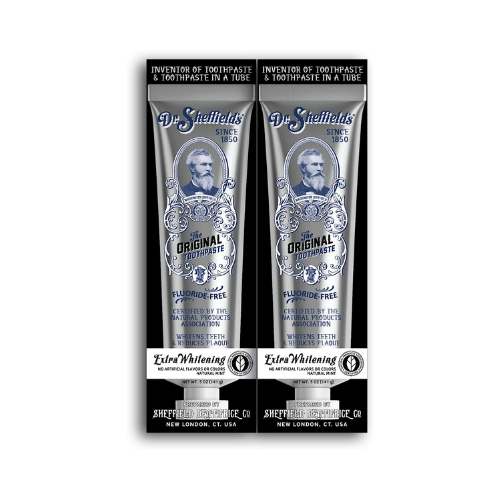Do Natural Teeth Whiteners Work?

Our editors independently select the products we recommend. We may earn a commission on items bought through our links.
Few body parts reflect age like teeth. A yellowed sheen reflects years of morning lattes and second or third glasses of red wine. A tune-up later in life can help upgrade cornsilk to the desirable eggshell, but professional laser whitening at the dentist can cost upwards of $1,000. And harsh ingredients in whitening toothpastes can damage enamel. This begs the question: do natural teeth whiteners do anything?
Today's Top Deals
Products like natural deodorants and natural dandruff remedies promise 1-1 alternatives to chemical-packed, non-natural hygiene products, but they’re often less effective than synthetic options. Natural teeth whiteners tend to fit the same script. They might not work as well as the typical teeth whitening products — and definitely aren’t as potent as clinical whitening — but they do satisfy the desire to avoid harsh chemicals.
The problem is, the most common “natural” teeth whitening ingredient is controversial, too. NYC-based dentist Nick Mavro of Apa Aesthetic urges patients to look for toothpaste that contains key whitening ingredients, particularly hydrogen peroxide, a chemical compound derived from water and one of most naturally occurring ingredients on the planet. And yet most of it is produced in industrial settings and may not fit the bill for customers looking to avoid anything synthetic.
“Just because something is labeled ‘all natural’ doesn’t mean it’s better or safer,” he said. “So many products are marketed by marketers; look for products that are marketed by industry professionals. Oral care advice should be coming from oral care professionals, even if it’s just aesthetic.”
Another option is baking soda, which is far less abrasive when it’s used in toothpaste than when it’s scrubbed directly onto teeth.
Regardless, Mavro said that baking soda should not be used consistently and over long periods of time, even in toothpastes, for risk of gum damage and enamel stripping.
The Most Effective “Natural” Whitening Ingredients, According to Experts
Both experts cited in this piece, not surprisingly, urge everyone to seek professional help for teeth whitening services, at least for a base layer. “In-house whitening is administered under professional care, so it can have higher percentages of bleach and deliver more immediate results,” said Mavro. The results are more evenly balanced and there’s less likelihood of blotchy teeth. It is also safer. “Technicians know how to isolate gum tissue to avoid irritation and inflammation,” said Mavro.. “And, if patients experience sensitivity, most technicians are equipped with a relief gel.”
Most at-home brand-name teeth whitening products contain hydrogen peroxide, known for its fast-acting results and for increasing sensitivity, said Beverly Hills-based cosmetic dentist Dr. Kevin Sands.
Carbamide peroxide, is another chemical compound to look for in toothpaste as a more natural teeth whitener. It’s been clinically shown to be effective and causes less sensitivity. It’s a mix of hydrogen peroxide with urea (a byproduct of human and animal waste that is commonly used in skin exfoliants and nail smoothers).
Both of these ingredients work, and while they might not be pantry staples, they’re easier to pronounce than other additions to the toothpaste label.
The Best “Natural” Teeth Whitening Solution

Arm & Hammer Advanced White Extreme Whitening Toothpaste
Buy Now at target
Buy Now at walmart
Buy Now at walgreens
“Look for a toothpaste that integrates an active whitener into its formula,” said Mavro. Coincidentally, both doctors endorse the same toothpaste as the best way to use natural ingredients to whiten the teeth: Arm & Hammer’s Advanced White formula.
The toothpaste’s two whitening ingredients are hydrogen peroxide and baking soda. So, it depends on one’s definition of “natural,” and whether that includes hydrogen peroxide. Both dentists also warned against using it every day, due to the abrasiveness of baking soda, and advised only using it for special occasions or ahead of special events. “It will whiten teeth but should not be considered a long-term solution,” Mavro added.
Other Commonly-Used Natural Ingredients
Activated Charcoal: “Activated charcoal is abrasive, so while it’s ‘removing stains,’ it may also be removing enamel, and for that reason, I do not recommend it to patients,” said Mavro. “Permanent damage to the outer layer of teeth, in my opinion, is not worth a minor improvement in color.”
Coconut Oil: Coconut oil has some benefits for oral health, but the results for teeth whitening are a stretch. “The fatty acids in coconut oil have been associated with having antibacterial properties, which may benefit your oral health,” said Sands. “Coconut oil kills the bacteria that cause gum disease and cavities. It even helps prevent periodontal disease and tooth decay.” Its teeth whitening capabilities are no better than a regular brushing section.
Apple Cider Vinegar: “Apple cider vinegar (ACV) is a highly acidic substance and can remove plaque and stains from teeth but can also damage enamel, leading to tooth sensitivity and loss,” explained Sands. “Proper use of ACV involves diluting it in water, using a straw, rinsing mouth after consumption, and avoiding immediate tooth brushing.” He said if you’re planning to ingest ACV for any number of purported health reasons, consider taking it in pill form to avoid direct acidic contact with teeth.
Baking Soda: This is the natural teeth whitener that’s closest to a common pantry staple with clinical backing. “Certain toothpastes incorporate baking soda for its whitening benefits. I myself use these products on occasion,” said Mavro. “My recommendation: Do not use these toothpastes every day. Use them sparingly and with intention for short periods of time, like a week before an important event.”
Citrus Rinds: “I do not recommend using orange peels as a teeth whitener,” said Sands. “Oranges contain citric acid, which can erode the enamel on your teeth. If you are determined to use a natural product to whiten your teeth, it’s much safer to use baking soda instead of an orange peel.”
What’s the ROI?
With natural whiteners, the return on investment is likely to be a negative one, especially if an ingredient is used improperly. Unregulated teeth whitening solutions can cause damage to teeth and result in expensive or irrevocable corrective measures. If one is insistent on avoiding professional whitening services, strips, gels, and trays — consider which natural ingredients have been shown to work and find a regulated formula to use occasionally.
The major pro of natural, over-the-counter alternatives to expensive procedures like teeth whitening is you save money. However, if you damage your teeth in the process and require surgery the main benefit has become a liability.
Also, maximizing ROI with natural teeth whiteners requires proper dental care and auditing the daily habits that may be contributing to discoloration. “Dark-colored teeth usually result from a combination of genetics and lifestyle. Obviously, genetics are out of our control, but lifestyle is another story,” said Mavro. This includes minimizing tooth exposure to things like smoking, dark colas, coffee, tomato sauce, red wine, and more. The return on investment for any brightening efforts will increase exponentially if these aggressors are minimized.
Other Teeth Whitening Solutions
Based on the expert advice above, here are a few additional toothpastes SPY editors recommend for those attempting to whiten their teeth naturally.

Arm & Hammer Essentials Fluoride Toothpaste
Buy Now On Amazon
This alternative toothpaste from Arm & Hammer is also made with 100% natural baking soda and free of many of the ingredients “natural” cosmetic shoppers are looking to avoid: parabens, peroxide, and artificial dyes. It also has fluoride, for helping prevent cavities and removing plaque.

Lumineux Teeth Whitening Toothpaste
Buy Now On Amazon
Lumineux’s toothpaste is made without harsh bleaches and sodium lauryl sulfate. It’s also formulated as microbiome-safe and to not kill the “good” bacteria within the digestive tract.

Dr. Sheffield's Certified Natural Toothpaste
Buy Now On Amazon
Dr. Sheffield’s toothpaste contains no genetically modified organisms or synthetic detergents. It also comes in an aluminum tube, a highly recyclable material that’s much more sustainable than plastic.
Frequently Asked Questions About Natural Teeth Whiteners
Is hydrogen peroxide natural?
Hydrogen peroxide can be found in nature, but in the context of toothpaste ingredients, it is typically not considered a natural ingredient because it’s commonly manufactured through industrial processes.
Do whitening toothpastes actually work?
Whitening toothpastes work, but not necessarily in the way they are marketed. Their whitening effect is typically limited to surface stains and they’re purported to prevent or slow staining as well. But if you have deep stains or want to drastically brighten the shade of your teeth, then it will require more than a toothpaste. At-home whitening strips, gels, and trays are a great resource, but a professional teeth whitening will provide the most drastic and consistent results, not to mention the safest ones.
Can you use hydrogen peroxide as a teeth whitening mouthwash?
Yes, you can use hydrogen peroxide, diluted with water, as a mouthwash to improve the brightness of your teeth, said Dr. Sands. But he says to speak with a dentist in advance of beginning this practice, to get any blessings or to meet necessary resistance.
“The solution whitens teeth and disinfects your mouth,” he explained. “Mix water and 3% hydrogen peroxide in a 2:1 ratio. Take a mouthful and swish it around the mouth for at least 30 seconds. Spit the contents out, then rinse your mouth with fresh water.”
More Top Deals from SPY
Best of SPY
